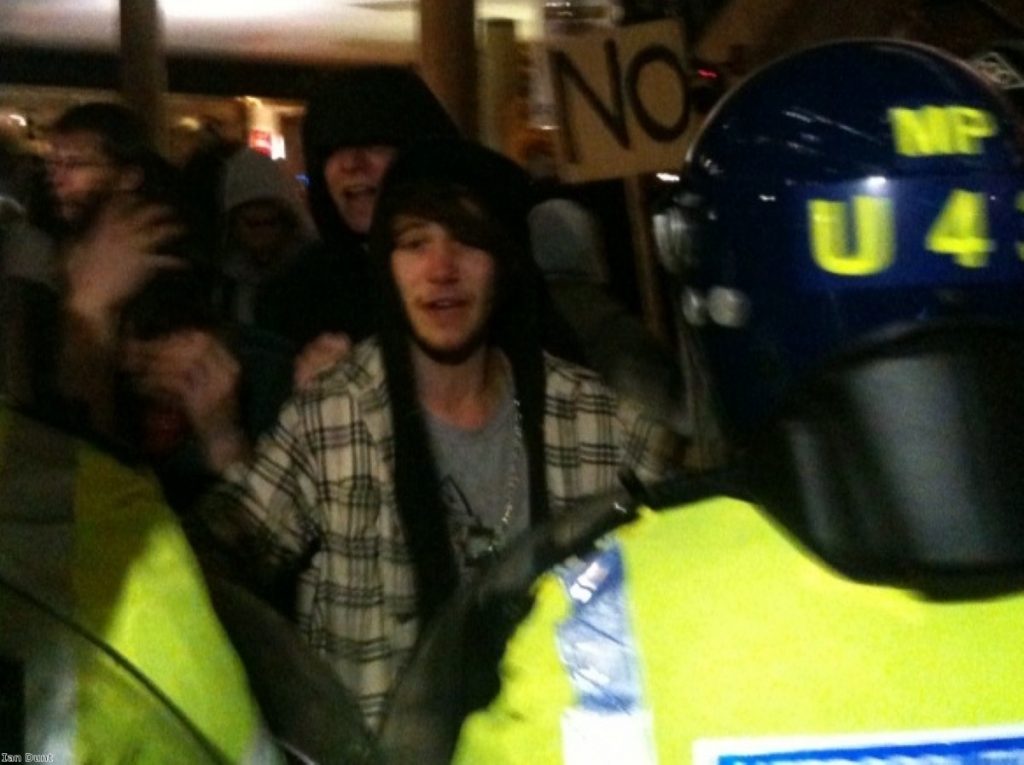The week in politics: Street fights and election disaster
Student riots, lost elections and a new born Miliband made for a busy week.
By Ian Dunt
It was about a busy week in news, but the media always loves a riot so that’s what we saw the most of. The ancient battle cry of “Tory scum” returned after a prolonged 13 year absence. So did smashed windows and riots in London, something we haven’t seen since the heights of the anti-globalisation movement – which actually bears more than a passing relationship to the student protest that hit Millbank on Wednesday.
Politicians and broadcasters were outraged by the attack on Tory HQ. The police launched an internal investigation into how they have become so sloppy, and there was general hand-wringing all round, not least of all from National Union of Student’s (NUS) president Aaron Porter, who reacted to the riot in the same way that cats react to the prospect of a bath. His fears were quickly realised when a few Tory MPs and right-wing bloggers smelt blood and tried actively to link him to the violence.


Tuition fees caused a bit of bloodshed in the Commons too, with Nick Clegg being given a minor kicking from Harriet Harman over his rather humiliating volte-face over higher education funding. The deputy Labour leader knew how these things went, she confided. “You’re at freshers’ week. You meet up with a dodgy bloke and do things that you regret. He’s being led astray by the Tories.”
David Cameron missed PMQs because he was in China. After a week of traditional China-related headlines about pushing for human rights while not ruining British business prospects, Cameron delivered his own version of that unique and impossible balancing act British prime ministers are forced into on trips to the rising superpower. No talk of ‘political freedom’ granted, but much reference to ‘political opening’. Ah, diplomacy. You’ve got to love it. Unless you’re under arrest for campaigning for the truth about tainted baby milk, of course.
Ed Miliband also had reasons to miss the weekly dust-up. His girlfriend gave birth to their second child, who they later called Samuel. There was much mirth when the Labour leader told reporters that the baby was “gorgeous”. And then: “He looks a bit like me.” Riiiiiight.
Other big Westminster moments saw the publication of each department’s business plan for the years ahead. It was a seriously important measure, but there was simply no sexiness to it, so we all sat around waiting for someone to smash a window. In preparation for his China trip, Cameron delivered the announcement surrounded by officials and without taking questions.
Iain Duncan Smith released his long-awaited welfare reform white paper towards the end of the week, an impressively detailed document which received a surprising amount of cross-party support. It looks like Labour will back most of it. His decision to brand it a “sin” to turn down work prompted a minor bit of “church and state” outcry, but the former Tory leader couldn’t really have wished for plainer sailing.
Plain sailing was precisely what the government wasn’t given on housing benefit reform, when the issue returned to the Commons for an opposition motion. Unusually the government didn’t add an amendment, which is traditionally the way with these things. Instead, Douglas Alexander and Iain Duncan Smith (again) traded a few insults. Instead of making Holocaust-related rhetoric a part of the debate, as had happened before, they attacked each other for allowing Holocaust-related rhetoric to be part of the debate. As for the actual policy, Labour basically back it but with reservations and on a slower timescale. It wasn’t the most inspirational thing in the world.
Also struggling for press attention were the three MPs who tried to use parliamentary privilege to defend themselves from a criminal trial on their expenses claims. That failed. No-one felt particularly sympathetic. Sympathy was also lacking for George Bush, whose return to the political stage was meant to start the process by which we would see him in a better light. Unfortunately Dubya delivered the usual trouble, backing waterboarding to prevent terror attacks and insisting that a plot to hit Heathrow and Canary Wharf had been thwarted because of the method. Cameron quickly distanced himself from it, and the British media (minus the Sun) was quick to join him.
But the second big story of the week was still Phil Woolas, who valiantly fought against his impending political doom by rallying friends and getting a fund set up for his (pointless) legal fight. Labour revealed its continued lack of unity by shouting down Harriet Harman for her comments about the former immigration minister over the weekend and that irritation at the leadership’s treatment of Woolas persisted throughout the week. It won’t be enough to save him, though. Neither the appeal or the judicial review would change the facts, just the judge’s interpretation. Still, you can’t blame a man for trying.









